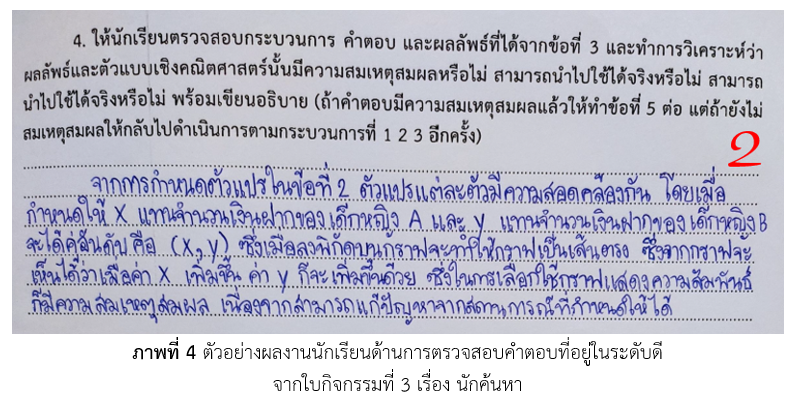การพัฒนากิจกรรมการเรียนรู้ตามแนวคิดการสร้างตัวแบบเชิงคณิตศาสตร์ร่วมกับเทคนิคเกมมิฟิเคชันเพื่อส่งเสริมทักษะการแก้ปัญหาทางคณิตศาสตร์ เรื่อง กราฟและความสัมพันธ์เชิงเส้น สำหรับนักเรียนชั้นมัธยมศึกษาปีที่ 1
Main Article Content
บทคัดย่อ
การวิจัยครั้งนี้มีวัตถุประสงค์เพื่อศึกษาผลการจัดการเรียนรู้ตามแนวคิดการสร้างตัวแบบเชิงคณิตศาสตร์ร่วมกับเทคนิคเกมมิฟิเคชันที่มีต่อทักษะการแก้ปัญหาทางคณิตศาสตร์ เรื่อง กราฟและความสัมพันธ์เชิงเส้น สำหรับนักเรียนชั้นมัธยมศึกษาปีที่ 1 โดยผู้เข้าร่วมวิจัย คือ นักเรียนชั้นมัธยมศึกษาปีที่ 1/1 โรงเรียนประจำจังหวัดแห่งหนึ่ง จำนวน 37 คน ภาคเรียนที่ 2 ปีการศึกษา 2564 และใช้รูปแบบวิจัยเชิงปฏิบัติการในชั้นเรียน เครื่องมือที่ใช้ในการวิจัย ได้แก่ แผนการจัดการเรียนรู้ ใบกิจกรรม และแบบทดสอบวัดทักษะการแก้ปัญหาทางคณิตศาสตร์ ข้อมูลที่เก็บรวบรวมได้จะนำมาวิเคราะห์เชิงเนื้อหา ผลการวิจัย พบว่า นักเรียนส่วนใหญ่มีพัฒนาการทักษะการแก้ปัญหาทางคณิตศาสตร์โดยรวมอยู่ในระดับดี เมื่อพิจารณาตามองค์ประกอบย่อยทั้ง 4 ด้าน พบว่า ด้านที่นักเรียนพัฒนามากที่สุด คือ ด้านการทำความเข้าใจปัญหา รองลงมา คือ ด้านการสร้างตัวแบบเชิงคณิตศาสตร์และด้านการตรวจสอบคำตอบ และด้านที่นักเรียนพัฒนาน้อยที่สุด คือ ด้านการดำเนินการแก้ปัญหา
Article Details

อนุญาตภายใต้เงื่อนไข Creative Commons Attribution-NonCommercial-NoDerivatives 4.0 International License.
วารสารวิทยาศาสตร์และวิทยาศาสตร์ศึกษา (JSSE) เป็นผู้ถือลิสิทธิ์บทความทุกบทความที่เผยแพร่ใน JSSE นี้ ทั้งนี้ ผู้เขียนจะต้องส่งแบบโอนลิขสิทธิ์บทความฉบับที่มีรายมือชื่อของผู้เขียนหลักหรือผู้ที่ได้รับมอบอำนาจแทนผู้เขียนทุกนให้กับ JSSE ก่อนที่บทความจะมีการเผยแพร่ผ่านเว็บไซต์ของวารสาร
แบบโอนลิขสิทธิ์บทความ (Copyright Transfer Form)
ทางวารสาร JSSE ได้กำหนดให้มีการกรอกแบบโอนลิขสิทธิ์บทความให้ครบถ้วนและส่งมายังกองบรรณาธิการในข้อมูลเสริม (supplementary data) พร้อมกับนิพนธ์ต้นฉบับ (manuscript) ที่ส่งมาขอรับการตีพิมพ์ ทั้งนี้ ผู้เขียนหลัก (corresponding authors) หรือผู้รับมอบอำนาจ (ในฐานะตัวแทนของผู้เขียนทุกคน) สามารถดำเนินการโอนลิขสิทธิ์บทความแทนผู้เขียนทั้งหมดได้ ซึ่งสามารถอัพโหลดไฟล์บทความต้นฉบับ (Manuscript) และไฟล์แบบโอนลิขสิทธิ์บทความ (Copyright Transfer Form) ในเมนู “Upload Submission” ดังนี้
1. อัพโหลดไฟล์บทความต้นฉบับ (Manuscript) ในเมนูย่อย Article Component > Article Text
2. อัพโหลดไฟล์แบบโอนลิขสิทธิ์บทความ (Copyright Transfer Form) ในเมนูย่อย Article Component > Other
ดาวน์โหลด ไฟล์แบบโอนลิขสิทธิ์บทความ (Copyright Transfer Form)
เอกสารอ้างอิง
GAIMME. (2016). Guidelines for Assessment & Instruction in Mathematical Modeling Education. United States of America: Printed and bound in the United States of America.
Glover, I. (2013). Play as You Learn: Gamification as a Technique for Motivating Learners. In: Herrington, J., Couros, A. and Irvine, V., Eds., Proceedings of World Conference on Educational Multimedia, Hypermedia and Telecommunications AACE. Sheffield Hallam: Sheffield Hallam University.
Hayamin, S. (2015). The Effect of using mathematical models to develop of mathematical problem solving on variation for grade 8 students. Master's thesis. Phitsanulok: Naresuan University.
Isoda, M. and Katagin, S. (2012). Mathematical thinking, how to develop it in classroom. In Stacey, Tall, Isoda, & Inprasluta (Ed.), Monographs on lesson study for teaching mathematics and sciences - Vol. 1. World Scientific: Singapore.
Meesuk, J. (2015). Organization of learning activities to enhance student participation behavior by using gamification techniques for students in science special classrooms, Mathayomsueksa 4 Anukulnaree. Master's thesis. Mahasarakham: Mahasarakham Rajabhat University.
Kanthawat, C. (2018). An action research on developing grade 11 students’ mathematical literacy through mathematical modeling in topic of sequences and series (in thai). Master’s Thesis. Phitsanulok: Naresuan University.
Khunsri, W. (2009). Teaching English to Children. Academic Journal, 12(3), 60-75.
Ministry of Education. (2017). Indicators and learning subjects in the core of mathematics learning subject groups. (Revised Edition B.E. 2560) According to the Core Curriculum of Basic Education B.E. 2551 (2008). Bangkok: Agricultural cooperative printing demonstrations of Thai co., Ltd.
Panich, V. (2012). 21st Century Skills: Learning for Life in Our Times. Bangkok: Printing House Tathata Publication Co., Ltd.
Saijam, P. and Seebut, S. (2017). Using problem approach to design mathematical modeling-based learning for promoting grade 8 students mathematical modeling competency. Proceedings of the 22nd Annual Meeting in Mathematics (AMM2017). Chiangmai: Chiangmai University.
The Institute for the Promotion of Teaching Science and Technology (IPST). (2016). Summary of research results of the TIMSS 2015 project. Retrieved 7 June 2021, from TIMMS Thailand: http://timssthailand.ipst.ac.th/timss/reports/TIMSS2015summary.
The Institute for the Promotion of Teaching Science and Technology (IPST). (2019). PISA 2018 Results: Executive Summary. Retrieved 7 June 2021, from PISA Thailand: https://pisathailand.ipst.ac.th/pisa2018-summary-result/.
Yuangklang, S. (2017). The development of blended learning system by using gamification-based learning to enhance the mathematics problem solving skills and connection skills to real life for Primary Schools. Doctoral Dissertation. Maha Sarakham: Maha Sarakham University.


